Hey, fellow dog lovers, have you ever noticed your furry friend acting a little off? It might be more than just a quirky personality trait. Sometimes, peculiar antics can be a red flag for something more serious. Before you brush it off as “just being a dog,” let’s dive into some behavior that might warrant a closer look.
1. When Your Pup Suddenly Hates Their Food
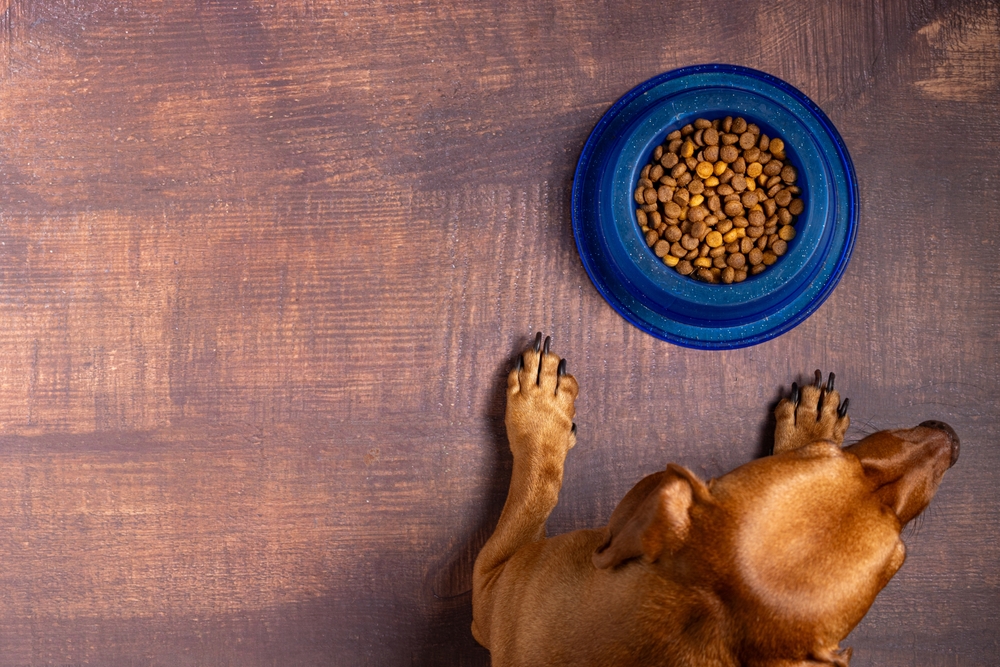
Does your dog suddenly turn their nose up at their dinner? While it’s easy to assume they’re just being picky, this could be a sign of something more troubling. Loss of appetite in dogs can indicate anything from dental issues to more serious health problems like gastrointestinal distress or even kidney disease. It’s not just about the kibble; it’s about their overall health. If your pup used to gobble up their food and now shows disinterest, it’s time to consult your vet. According to WebMD, loss of appetite in dogs can be due to various reasons, including pickiness, illness, or other underlying issues.
Don’t forget, dogs can’t tell us when something’s wrong, so abrupt changes in eating habits shouldn’t be ignored. While it’s possible they’re just bored with their food, it’s better to be safe than sorry. A quick trip to the vet could catch something early that could save you and your pooch a lot of heartaches. So, keep a watchful eye on those eating habits; it might just be your dog’s way of saying, “I need help.”
2. If Your Dog’s Bark Turns Into A Constant Symphony

Has your canine companion started a barking marathon? While barking is just part of dog life, excessive barking could be more than just a bid for attention. It might indicate anxiety, discomfort, or even cognitive dysfunction syndrome (CDS), especially in older dogs. Barking is one of the few ways dogs communicate, so when they’re doing it non-stop, they’re trying to tell you something. As noted by the RSPCA, excessive barking can indicate that something isn’t right and may cause problems for others.
Moreover, changes in barking patterns can be linked to territorial issues or even sensory declines like hearing loss. If your dog’s barking starts to wear on your nerves (and your neighbor’s), it might be time to delve deeper into the cause. A vet visit can help rule out any medical issues, and an animal behaviorist can assist with pinpointing anxiety triggers. The key is to listen to what your dog is “saying” through all that noise.
3. When Your Dog Becomes A Couch Potato Overnight
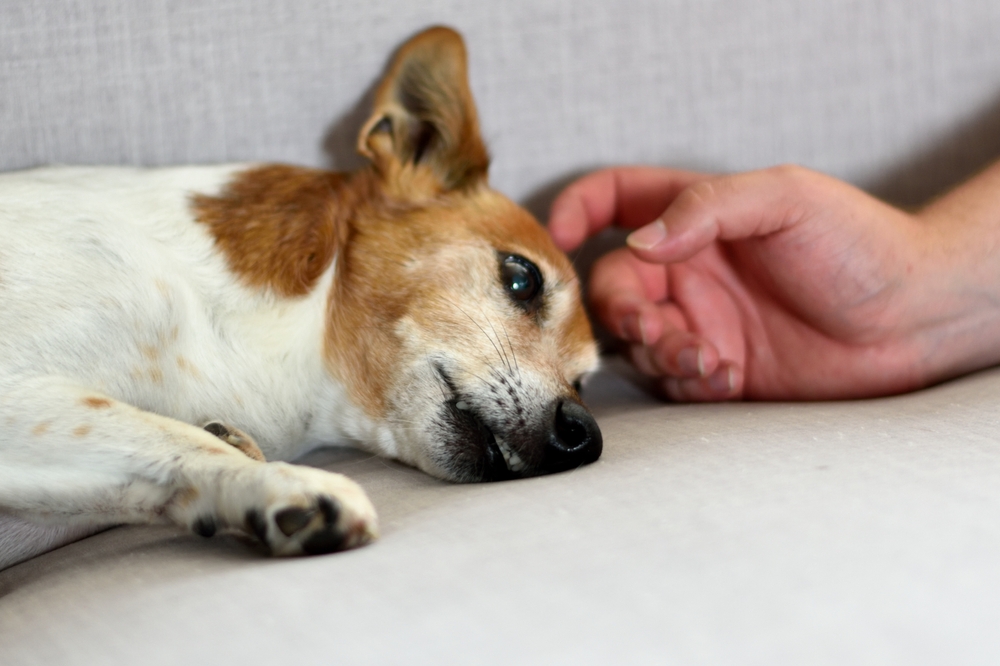
Was your dog once a bundle of energy, now barely lifting their head for a walk? Sudden lethargy shouldn’t be dismissed as laziness. It could be a sign of underlying health issues like hypothyroidism, anemia, or heart problems. Dogs are creatures of habit, so a stark change in activity level can be a red flag.
It’s essential to pay attention to these shifts, especially if they’re accompanied by other symptoms like weight gain or refusal to climb stairs. While some dogs naturally mellow out as they age, an abrupt change in energy levels deserves a vet’s attention. A check-up can help ensure there’s no serious health condition lurking beneath the surface. Remember, you know your dog best, so trust your gut if something seems off.
4. If Fido Becomes A Houdini

Is your dog suddenly making escape attempts worthy of a magician? While some dogs have a natural wanderlust, a sudden urge to flee could indicate anxiety or stress. It might be triggered by changes in their environment, such as a new pet, a new home, or even a change in family dynamics. Escape behavior can also be a sign that your dog is in pain or discomfort and trying to find relief or solitude.
It’s crucial to evaluate what’s changed in your dog’s world that might be causing this behavior. Have you moved recently, introduced a new pet, or experienced a change in household routine? Understanding the root cause is key to addressing the behavior. Besides preventing potential harm to your dog, resolving escape behavior can lead to a happier, more content canine companion.
5. When Your Pup’s Grooming Habits Go Haywire

Does your dog suddenly spend more time licking or chewing on themselves? While grooming is normal, excessive licking or chewing can be a sign of skin allergies, parasites, or even anxiety. It’s their way of scratching an itch or soothing themselves if they’re feeling anxious or stressed. Ignoring this behavior can lead to skin infections or injuries that can compound the problem.
Pay attention to any new changes in their environment or diet that might have triggered an allergic reaction. It’s crucial to get to the bottom of this behavior with a vet’s help. They can rule out parasites or provide allergy testing to diagnose the issue. With the right treatment, your pup can be back to their normal, carefree self in no time.
6. If They’re Snapping Or Growling More Than Usual

Is your previously sweet-tempered dog starting to growl or snap at the slightest provocation? It’s not just a phase; this behavior shift can be concerning. Increased aggression can be a symptom of pain, illness, or even neurological disorders. It might also stem from fear or anxiety, especially if your dog’s environment or routine has changed.
You know your dog’s temperament best, so if they’re acting out of character, it’s time to investigate. While it might be instinctual to discipline, understanding the root cause is far more critical. A vet can help determine if there’s a medical issue, while a behaviorist can offer insights into emotional triggers. Addressing these factors helps ensure your dog remains the loving companion you cherish.
7. When Your Dog Becomes A Night Owl

Has your dog’s sleep schedule turned upside down, leaving them more active at night? This flip might be more than just a quirk. Changes in sleep patterns can indicate health issues such as arthritis pain, cognitive dysfunction, or even diabetes. It’s not just about lost sleep for your dog; it’s a potential marker of discomfort or disease.
Older dogs are more prone to sleep disturbances due to age-related changes, so it’s vital to monitor these patterns closely. Consistent sleepless nights can take a toll on your dog’s overall health, making it crucial to seek veterinary advice. They can perform tests to determine if there’s an underlying health issue causing your pup’s insomnia. With the right diagnosis and treatment, you might both get a better night’s sleep.
8. If Your Dog’s Tail Stops Wagging

A wagging tail is a sign of a happy dog, so what does it mean when that wag disappears? A sudden lack of tail movement could be a cause for concern. Known as “limber tail,” it can result from overuse, cold weather, or even injury. It might also indicate pain or discomfort elsewhere in the body.
If your dog’s tail is droopy or seems painful, it’s worth a trip to the vet. They can check for possible injuries or underlying conditions contributing to the change. While a limp tail might seem minor, it can signify something more serious. Early intervention can prevent further pain and ensure your dog gets back to being their joyful self.
9. When Your Dog Becomes The Shadow You Never Asked For
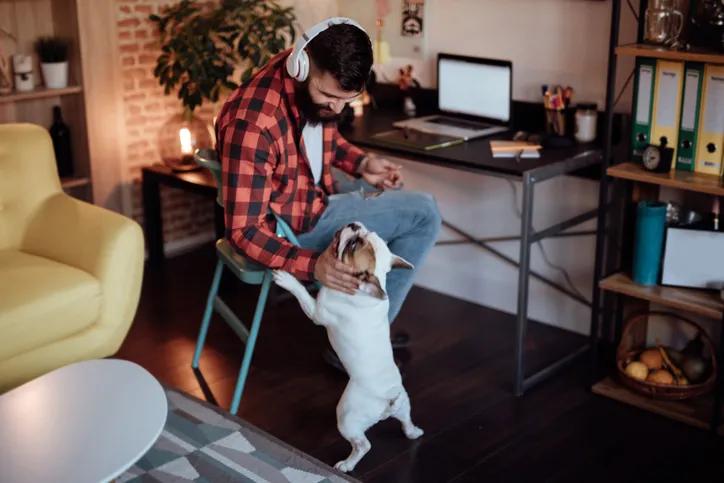
Is your dog suddenly glued to your side, following you from room to room? While dogs are social animals, an increase in clinginess can be a sign of anxiety or insecurity. It might indicate they’re unwell, frightened, or stressed by changes in their environment. Dogs often seek solace by staying close to their trusted human when they’re not feeling their best.
If your dog’s newfound attachment seems excessive, it’s worth considering recent changes in their life. Have you moved, changed your routine, or introduced new family members or pets? Identifying these triggers can help you address their underlying anxiety. Consulting a vet or behaviorist can provide strategies to help your dog feel secure and comfortable once more.
10. If Your Dog’s Toileting Habits Go Rogue
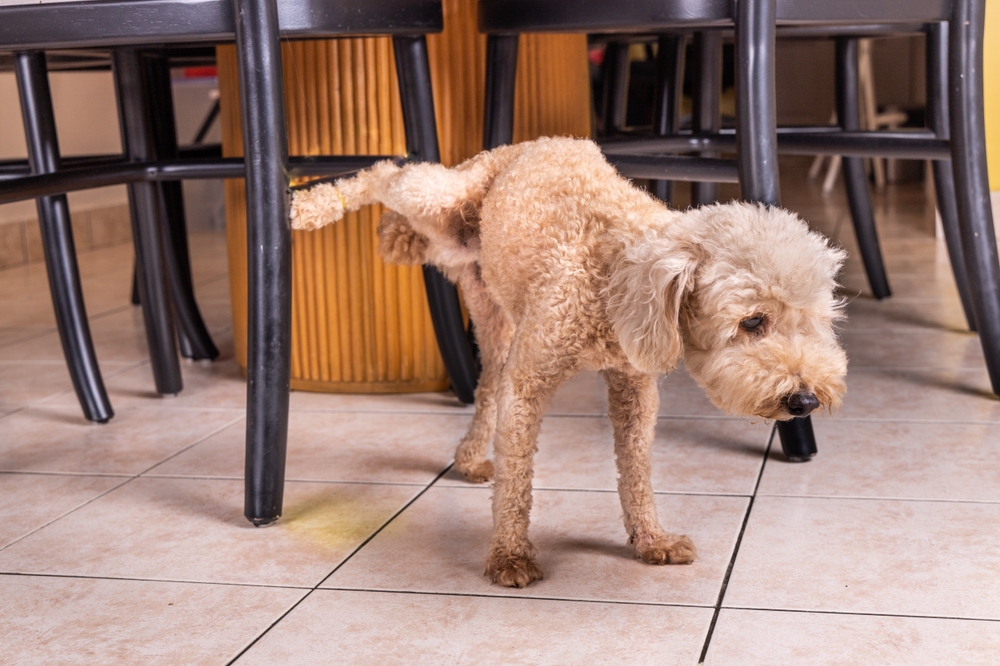
Is your house-trained dog suddenly having accidents indoors? While it can be tempting to chalk it up to behavioral issues, this can be a sign of health problems. Conditions like urinary tract infections, kidney disease, or diabetes can lead to sudden changes in bathroom habits. It’s not just an inconvenience; it’s your dog’s way of signaling that something’s amiss.
Keep an eye on any patterns in their accidents—frequency, location, time of day—which can help your vet diagnose the issue. Ignoring this behavior not only risks your home but your dog’s health. A quick veterinary visit can help identify and treat any medical conditions responsible for the change. With appropriate care, both you and your dog can go back to enjoying a well-managed household.
11. When Your Dog Plays Tug-of-War With Their Leash
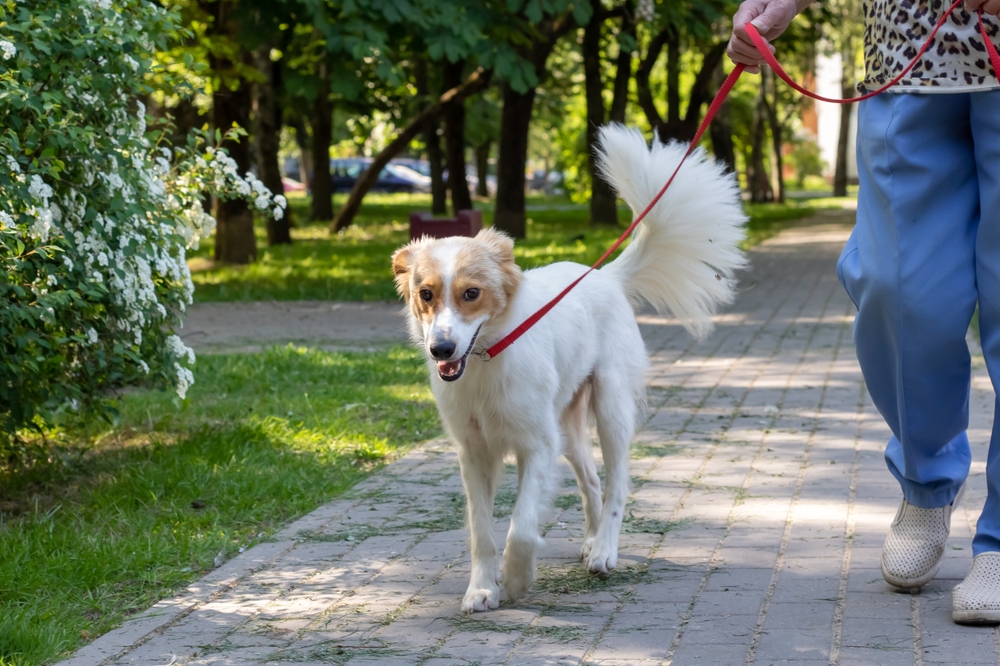
Has your dog turned walks into a battle of wills, pulling on their leash like it’s their job? While some pulling is normal, excessive pulling might indicate stress, anxiety, or lack of training. It can also be a sign that your dog is trying to avoid something unpleasant on the walk, like a specific location or encounter. This behavior not only makes walks stressful but can also lead to injury for both you and your dog.
It’s crucial to assess what’s going on during these walks that might trigger this behavior. Are there new routes, different times, or unfamiliar dogs that could be causing anxiety? A consistent training regimen and professional guidance can help address leash-pulling issues. With patience and practice, walks can become a positive experience for you and your dog once again.
12. If Your Dog Becomes A Water Bowl Hog

Is your dog suddenly drinking water like it’s going out of style? While increased thirst might seem harmless, it can indicate serious health concerns like diabetes, kidney disease, or Cushing’s disease. Dogs naturally drink more during warm weather or after exercise, but a persistent increase in water intake is cause for concern.
It’s essential to track your dog’s water consumption and note any accompanying symptoms such as increased urination or changes in appetite. A visit to the vet can help identify any underlying health issues and ensure your pet gets the necessary treatment. Early detection is vital, as these conditions can be managed more effectively when caught early. So, if your dog’s acting like a dehydrated camel, it’s time for a professional evaluation.
13. When Your Dog Starts Acting Like A Drama Queen

Is your dog suddenly whining, whimpering, or acting overly dramatic? While dogs can be vocal, excessive whining can be a sign of pain, anxiety, or discomfort. It might also be a plea for attention or an indication that they’re feeling insecure. It’s crucial to pay attention to when and why your dog is whining to understand its root cause.
Note any changes in their environment or routine that might have triggered this behavior. Has a new pet arrived, or have you been busier than usual? Addressing these stressors and consulting a vet can help determine if there’s an underlying health issue. With a little patience and care, you can help your dog feel secure and confident once again.
14. If Your Dog’s Chewing Becomes Destructive
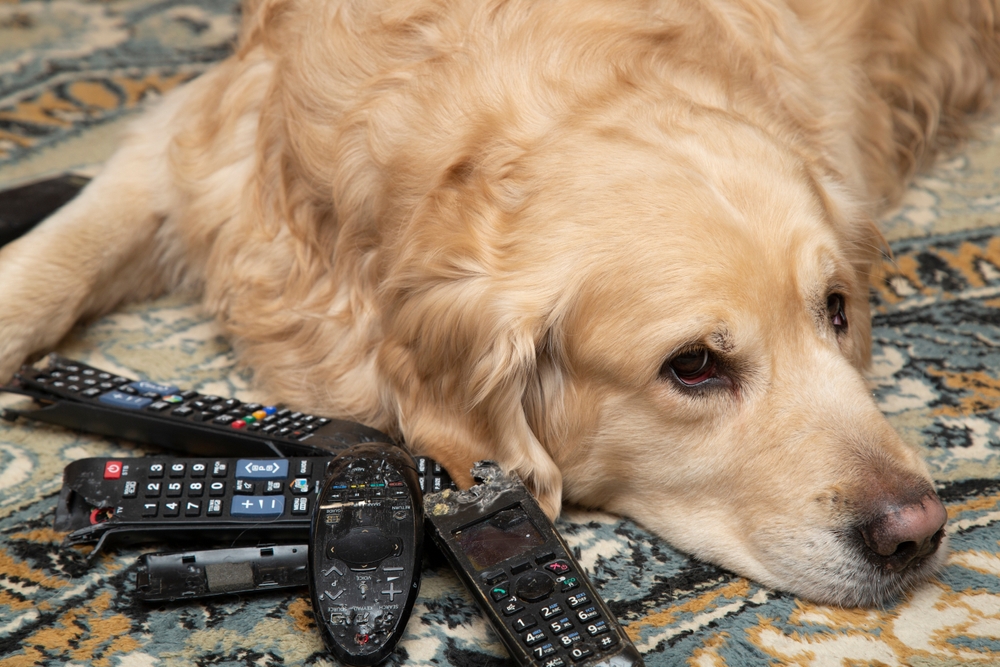
Has your dog turned into a demolition expert, chewing on anything in sight? While chewing is a natural behavior for dogs, excessive or destructive chewing can indicate stress, anxiety, or boredom. It might also be a sign of dental issues or discomfort. It’s important to differentiate between normal and problematic chewing to protect both your belongings and your dog’s health.
Assess what’s changed in your dog’s life that might trigger this behavior. Have you altered their routine, introduced new pets, or moved to a new home? Addressing these factors and providing appropriate chew toys can help redirect their chewing to acceptable outlets. A vet visit can rule out any dental problems and ensure your dog remains healthy and content.
15. When Fido Becomes A Picky Sleeper

Is your dog suddenly fussy about where they sleep or constantly changing their sleeping spots? While this might seem like a simple preference, it could indicate discomfort, anxiety, or health issues like arthritis. Dogs seek out different sleeping spots when they’re trying to find relief from pain or when feeling insecure.
It’s essential to monitor your dog’s behavior and note any accompanying symptoms like limping or difficulty getting up. Consult your vet if this behavior persists, as it could be a sign of an underlying health problem. With proper care and treatment, your dog can find comfort and security in their sleeping arrangements once more. Plus, you can both enjoy a good night’s rest knowing everything is as it should be.
